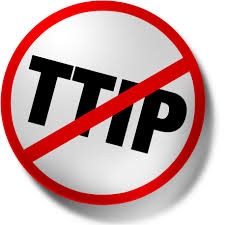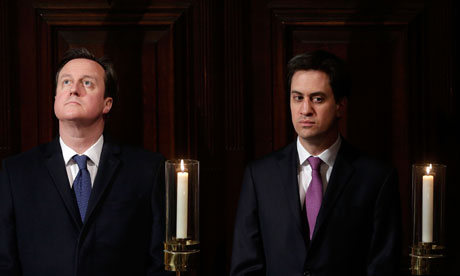 Part One - Why You Should Vote
Part One - Why You Should Vote
One week to go until the European Parliament elections. Are you excited yet? I trust we shall all be voting? No. Well, you should. As I explained in an earlier post, not voting ISN'T - as Russell Brand would have us believe - a protest. If there's no party you feel represents your views, I sympathise, but at least have the good grace to turn up and spoil your ballot paper. Because not voting at all means only one thing: the politicians get to ignore you. And that can't be good.
Plus, the thing about the EU elections is that the vote is conducted under proportional representation, or PR - specifically by the Closed Party List system. Without getting too technical, this basically means that the constituencies for the election are huge and return multiple members - the South-East of England, for example, returns ten. Every vote counts, and the members are allocated by the percentage of the votes that were cast for that party (unlike in general elections, you vote for a party rather than an individual).
Continuing our example, in the South East in 2009 the results were as follows:
- Conservative Party: 34.8% of the vote; 4 MEPs
- UKIP: 18.8% of the vote; 2 MEPs
- Liberal Democrats: 14.1% of the vote; 2 MEPs
- Green Party: 11.6% of the vote; 1 MEP
- Labour Party: 8.2% of the vote; 1 MEP
- BNP: 4.4% of the vote; 0 MEPs
[SOURCE: BBC News]
As you can see, PR a far more democratic way of allocating seats than the First-Past-the-Post system used in Local and General Elections. Under such a system, the Conservatives in the UK would have gotten all 10 South-East England MEPs. This would therefore waste all of the votes cast for the other parties, as well as all of the excess votes which the Tories had over their closest competitor, UKIP - 15.9%. Therefore, under FPtP, only 18.9% of the electorate's opinions would have been taken into consideration. PR isn't perfect - no representative system can be - but at least under this system the MEPs in the chamber far more closely match the wishes of the electorate.
I digress somewhat. The point is, PR is far more democratic than any other system, so the old rallying cry of the apathetic voter - 'My vote won't make any difference' - no longer holds. The EU election is one election where every vote really DOES make a difference. The UKIP claim that 70% of our laws are made in Brussels may not be true, but in the region of 7% of primary and 14% of secondary legislation DOES originate from within the EU apparatus, and that is something not to be taken lightly.
I'm no Eurosceptic, but is is true to say that the EU is fundamentally antidemocratic in its current form. We have the power to change that, and to forge a Europe that works for all of its people - but if we continue the current trend of only around one-third of the population voting, that will never happen.
Part Two - Who to Vote For?
Right then. Now I've done the slightly ranty bit, it's about time I cast an eye on the bunch of toerags actually looking for your vote. Now, descriptions of each major party and their policies can be found here, but I will summarise each of their broad positions for you, with particular focus on Europe, of course.
The Conservative Party
- Currently the largest party in the coalition government, the Conservatives are ideologically committed to neoliberal economics. This essentially means they want reduced state spending, a deregulated capitalist market, a restricted welfare state and no state ownership of industry
- Conservative social policy is, unsurprisingly, conservative - they support, in general, traditional institutions such as the monarchy and Christian values such as the nuclear family. They are also very authoritarian, favouring harsh anti-terror measures and the use of prisons
- The Conservative view on the EU is mixed, with some members - such as Nicholas Soames, grandson of Winston Churchill - being strongly in favour of the EU, whilst a growing percentage are committed Eurosceptics
- The party is committed to holding a renegotiation of the UK's settlement with the EU, followed by an in-out referendum on the basis of that renegotiated relationship to be held no later than the end of 2017. Prime Minister David Cameron has pledged to step down as PM if he is unable to deliver on this promise
The Labour Party
- Currently the largest opposition party, Labour broadly support the same neoliberal economics as the Conservatives, although they favour slightly more regulation of the market and there have been some hints they may be willing to renationalise the rail industry
- Labour social policy is less conservative than the Conservatives', but they are equally authoritarian and much of the anti-terror legislation currently in place was drafted under the last Labour government
- The Labour Party is divided on the issue of the EU. Whilst there are few members as outwardly Eurosceptic as some Conservatives, there is a broad range of opinion within the party
- The Labour leadership has refused to make any clear statement on the issue of the EU, though it is generally assumed they are pro-Europe. They are committed to a referendum if any further treaty to transfer powers to Brussels is proposed
The Liberal Democrats
- The Lib Dems are the smaller partner in the coalition government. They are committed to neoliberalism, as the other main parties, although they have acted as a slight moderating influence on the extreme neoliberalisation of the Conservatives
- Lib Dem social policy is relatively liberal and they are strong advocates of equal rights etc. However, they have signed up to the authoritarianism of the Coalition and have backed such Tory proposals as secret courts in which the defendant may not even know the charges against them
- The Liberal Democrats are very pro-Europe and are committed to a referendum only if significant powers are to be given up by the UK. They wish to stay in the EU
The United Kingdom Independence Party
- UKIP have no Westminster representation but are increasingly popular in the opinion polls. They are the most neoliberal of the main parties, advocating such things as a flat income tax rate and the scrapping of maternity leave
- UKIP social policy is highly conservative and many candidates have expressed extremely distasteful views with regards to equality and democracy in the UK. They are generally less authoritarian than the above parties, however, though they wish to implement strict immigration controls to limit annual net migration
- UKIP's position on the EU is very clear - they want the UK to withdraw immediately, without any referendum or renegotiation on the issue
The Green Party
- The Greens have only one Westminster MP. They are the largest UK party not committed to neoliberal economics, and advocate extensive market re-regulation and the renationalisation of the rail and energy industries, amongst others, as well as a more comprehensive welfare state
- Green social policy is extremely liberal, being outspoken proponents of equal rights for LGBT people etc. and they are committed anti-authoritarians
- The Green policy on Europe is somewhat mixed - they want to remain part of the EU, but campaign for increased democracy within it and a shift in focus away from the interests of big businesses
The British National Party
- The BNP are an openly racist, fascistic organisation. They advocate corporatism as an economic system and a very harsh social policy, as well as strict authoritarian controls and the immediate cessation of immigration - quite possibly along with the expulsion of existing migrants
So, there we go - these are the six UK-wide parties currently in with a chance to win MEPs. I haven't covered the SNP, Plaid Cymru or the Northern Irish parties on the basis that if you live in Wales, Scotland or Northern Ireland you probably know a hell of a lot more about those organisations than I do, but in general the SNP, Plaid and the Irish republican parties are pro-EU while the unionist parties tend to be more Eurosceptic.
Who to vote for, then? Well to me the choice seems quite simple. If you want out of the EU, vote Conservative - UKIP have no chance of achieving power in 2015, and never turn up to the EU Parliament so are useless as representatives, whereas at least the Tories are offering a realistic prospect of a referendum. If you want to stay in - and I hope you do - vote Green: they are highly active members of the EU Parliament who do their best to defend the interests of people over businesses and the political elites, and will campaign for reform to the issues which do admittedly plague the EU as is.
I can see no real reason to vote Labour - they have resolutely ignored the issue of Europe in all their election broadcasts and speeches, so frankly they don't deserve your consideration. The Liberal Democrats are slightly too comfortable with the anti-democratic features of the EU for my liking - plus, they're due some comeuppance for their treachery in joining the Tories in the first place - but they're not the worst choice you could make. I would reiterate, though, that both of these parties are signed up to the same neoliberal economic consensus that the Tories are, so if you're unhappy with the way the economy works for ordinary people, I urge you to consider the Greens.
Detecting any hint of bias yet? Good - I should hope so.
Oh, and don't vote BNP. Just don't.
Part Three - What Everyone Else Reckons
Here, have some polling data before you go. You know you want to!
This graph shows the fluctuations which have been taking place over the most recent polls. Labour, the Tories and UKIP have converged - meanwhile, so have the Lib Dems and the Greens. Looks like it might be all to play for after all
The polynomial trendlines of the data smooth out the smaller changes to show the bigger picture. As we can see, despite a period in the lead UKIP look like they may well be on a downward trajectory. Meanwhile, the Tories are on the up and the Greens are catching the Lib Dems
These rolling averages are very crude, but they at least give some idea of what the election would look like were it held tomorrow. Given that there's only a week to go, time is running out for the parties to lay claim to their voters. At the moment, Labour and UKIP are neck-and-neck and the Tories (factoring in the three-point margin of error) aren't far behind. It's going to be close!
 Europe-bashing has become mainstream within British politics. UKIP have succeeded in driving the political debate sharply to the right on immigration, with the result that a recent ICM poll put immigration as the number two issue in the British political mindset - just four points behind the NHS. This has fuelled a backlash against the EU - now, even the Europhile Liberal Democrats are joining the assault against Brussels.
Europe-bashing has become mainstream within British politics. UKIP have succeeded in driving the political debate sharply to the right on immigration, with the result that a recent ICM poll put immigration as the number two issue in the British political mindset - just four points behind the NHS. This has fuelled a backlash against the EU - now, even the Europhile Liberal Democrats are joining the assault against Brussels. The four freedoms are also, incidentally, something which derive from the Single European Act of 1986 - a treaty which was in large part the brainchild of Margaret Thatcher, something which is a never-ending source of amusement for me as the Thatcherite parties (the Tories and UKIP) try to backpedal on one of the most important achievements of their predecessor's premiership.
The four freedoms are also, incidentally, something which derive from the Single European Act of 1986 - a treaty which was in large part the brainchild of Margaret Thatcher, something which is a never-ending source of amusement for me as the Thatcherite parties (the Tories and UKIP) try to backpedal on one of the most important achievements of their predecessor's premiership.














